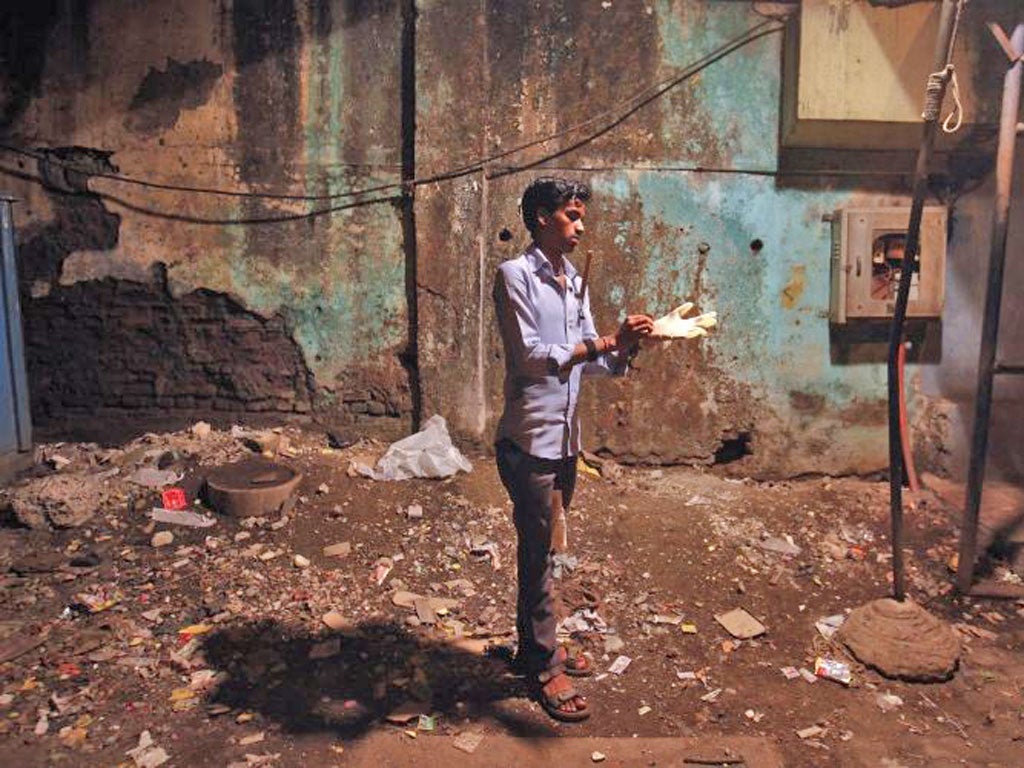Mumbai's eager rat catchers on the front line in fight against disease Mumbai's rat catchers serve on the front line in struggle against disease

There is something of a swagger about Vilas Ubhare when he sets about killing a rat. His stick comes down fast, the rat is dispatched and then in a fluid, unbroken motion Mr Ubhare hooks his toe under the rodent's tail, flips the corpse into the air and catches it neatly in a sack. It is like watching a footballer perform tricks in the park.
Mr Ubhare is among a 44-strong team in Mumbai that represents the frontline in the battle against an estimated 88 million rats besieging India's largest metropolis.
Every night he and his colleagues endure filthy conditions and the risk of disease to kill rats with nothing more than a metal-tipped stick and a torch. Should they fail to meet their quota of 30 rodents, they have 24 hours to make up the shortfall or lose a day's pay.
Yet these rat catchers – deemed essential by the city authorities – are under threat. Animal rights activists want to put an end to the rat-killing, saying it is inhumane. Officials say the matter is being considered.
Sometimes it seems rats are everywhere in Mumbai. They scurry in the quiet, tree-lined streets of Colaba and pause late at night on the platform at Churchgate station as the last, weary commuters make their way home to the suburbs. The damp, cramped conditions, with rubbish and litter strewn in the streets, create an ideal environment for vermin and a report earlier this year estimated the rat population was growing annually by 10 per cent. Slum areas such as Dharavi and Govandi are said to be home to the most.
The Municipal Corporation of Greater Mumbai (BMC) employs various ways of tackling the issue, including traps and poison, but insists that the night rat killers play an essential role. Yogesh Naik, an official with the sanitation department, said he wishes there were more. "We only have 44 rat killers. They can cover from Churchgate to Dadar. We'd like to enlarge the area we cover. We need 200 to cover the whole city," he said, saying that they were currently filling 92 more positions. "The problem is red tape."
Despite the unsavoury aspects of the position, competition for the positions, which come with the benefits of a government job and a monthly salary of around £160, is intense. When the authorities last advertised for 30 positions they received 2,000 applications, including that of a college graduate. "It's because unemployment is going up," said Mr Naik.
Shortly after midnight on a recent, humid weekday, Mr Ubhare and two other night rat killers, Milind Ganapat and Tushar Tirai, pulled up on their scooters outside a block of apartments in the Lower Parel neighbourhood. Apart from their sticks and torches, they had no equipment and dressed in normal clothes and sandals.
"We have the torch. When we see a rat, we flash the light at its head," said Mr Tirai. "The rat gets a shock and for a few seconds it freezes. It is in those seconds that we have to hit it. If we miss, it runs away."
Yet killing rats is not a simple or straightforward task, Mr Tirai said. A stunned rat could bite or jump at the ankles and the waste and urine carried disease.
And some activists want to stop the rat killers. Earlier this summer, the Animal Welfare Board of India, wrote to the BMC asking them to stop clubbing the rats and instead kill them humanely.
Subscribe to Independent Premium to bookmark this article
Want to bookmark your favourite articles and stories to read or reference later? Start your Independent Premium subscription today.

Join our commenting forum
Join thought-provoking conversations, follow other Independent readers and see their replies